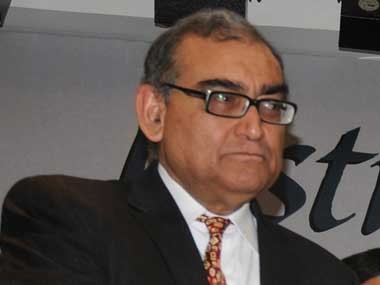
Press Council of India chairman and former Supreme Court judge Justice Markandey Katju on Sunday revealed the so-called unscrupulous appointment of a Madras High Court judge under pressure from an ally party in the UPA government, throwing light on the issue of corruption in the judiciary.
Katju blamed a former chief justice of Madras High Court of deleting "adverse entries" against a "corrupt" judge, to appoint him as the district judge in the court who held his post at the time of Katju's tenure as the chief justice of the Madras High Court in 2004.
Citing political pressure in the appointment of the judge, Katju wrote in his blog, "That judge had the solid support of a very important political leader of Tamil Nadu. I was told that this was because while a district judge he had granted bail to that political leader."
Katju further goes on to reveal that even after an inquiry had shown the judge's corruption, he was given another year as an "additional judge" by then CJI RC Lahoti due to pressure from a Tamil Nadu party, without naming it openly.
The party had allegedly threatened to withdraw support if the judge was not allowed to continue. The judge was subsequently allowed to function as additional judge by the next CJI YK Sabharwal and was later made a permanent judge and shifted to a different court by his successor CJI KG Balakrishnan.
Though his allegations come long after the UPA government came to power, it shows how the Congress party was often arm-twisted by its allies. Dravida Munnetra Kazhagham (DMK) from Tamil Nadu was the largest ally from the south for the UPA I government.
The fact that Katju says that former Prime Minister Manmohan Singh was issued a threat of withdrawal of support just when he was to leave for a UN summit, shows the blatant pressure tactics that the ally exerted on him.
For nine years, the DMK remained the largest ally in the UPA government with 18 Lok Sabha MPs in UPA-II and 6 of them accommodated as union ministers.
During the 2G scam in which DMK chief Karunandihi's daughter Kanimozhi was in the spotlight, DMK had reportedly asked its six Union ministers to be on stand-by and be ready to resign if the CBI chargesheeted her, as per a Times Now report.
It had also demanded posts for its party members during the cabinet formations by the central government, demanding four berths in 2009, as per a Rediff report.
However, the only bargaining power for the Congress was that DMK was looking to it for support in the Tamil Nadu elections.
Katju's post unsurprisingly led to an uproar in the Parliament, with the AIADMK, the main rival of DMK, raising the issue in the Rajya Sabha on Monday, demanding to know if the latter had put pressure on the then government to protect the judge.
This is not the first time that the morality of the Indian judiciary has come under the scanner. In 2010, former Law Minister Shanthi Bhushan had alleged that eight former chief justices of India were corrupt, according to a Times of India report, while The Indian Express had reported in 2012 that of the 21 judges to have retired from the Supreme Court since January 2008, 18 got jobs in different government commissions and tribunals, again questioning the integrity of judges.















